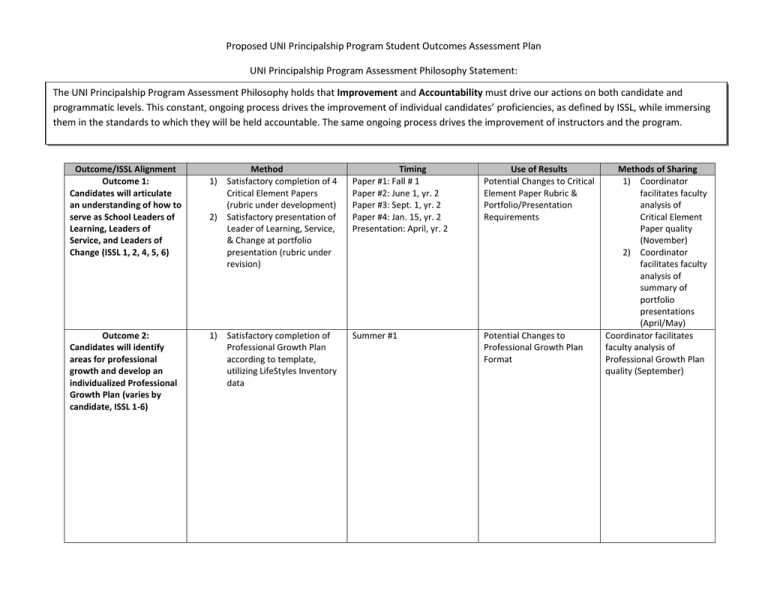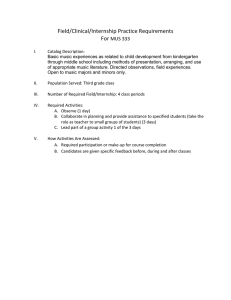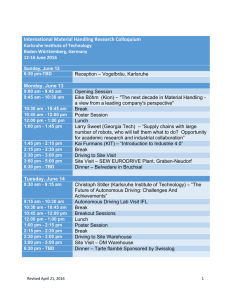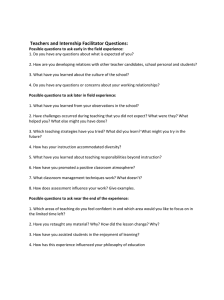Proposed UNI Principalship Program Student Outcomes Assessment Plan
advertisement

Proposed UNI Principalship Program Student Outcomes Assessment Plan UNI Principalship Program Assessment Philosophy Statement: The UNI Principalship Program Assessment Philosophy holds that Improvement and Accountability must drive our actions on both candidate and programmatic levels. This constant, ongoing process drives the improvement of individual candidates’ proficiencies, as defined by ISSL, while immersing them in the standards to which they will be held accountable. The same ongoing process drives the improvement of instructors and the program. Outcome/ISSL Alignment Outcome 1: Candidates will articulate an understanding of how to serve as School Leaders of Learning, Leaders of Service, and Leaders of Change (ISSL 1, 2, 4, 5, 6) Method 1) Satisfactory completion of 4 Critical Element Papers (rubric under development) 2) Satisfactory presentation of Leader of Learning, Service, & Change at portfolio presentation (rubric under revision) Timing Paper #1: Fall # 1 Paper #2: June 1, yr. 2 Paper #3: Sept. 1, yr. 2 Paper #4: Jan. 15, yr. 2 Presentation: April, yr. 2 Use of Results Potential Changes to Critical Element Paper Rubric & Portfolio/Presentation Requirements Outcome 2: Candidates will identify areas for professional growth and develop an individualized Professional Growth Plan (varies by candidate, ISSL 1-6) 1) Satisfactory completion of Professional Growth Plan according to template, utilizing LifeStyles Inventory data Summer #1 Potential Changes to Professional Growth Plan Format Methods of Sharing 1) Coordinator facilitates faculty analysis of Critical Element Paper quality (November) 2) Coordinator facilitates faculty analysis of summary of portfolio presentations (April/May) Coordinator facilitates faculty analysis of Professional Growth Plan quality (September) Outcome 3: Candidates will identify and present artifacts and experiences that serve as evidence of their competence as school leaders as measured by ISSL. (ISSL 1-6) 1) Satisfactory construction & presentation of professional portfolio (rubric under revision) Final Semester in program Outcome Outcome 4: Candidates will demonstrate competence as Reflective Writers and Thinkers. (ISSL 2, 4) Method 1) Satisfactory completion of all program writing requirements (rubrics under revision) 2) Pre & Post Writing Sample (under discussion) 1) Satisfactory ongoing progress on internship, monitored on SMS 2) Satisfactory ongoing progress on internship, monitored by mentor, advisor, & field supervisor 3) Students will satisfactorily complete all ISSL-aligned course assignments 4) Students will satisfactorily complete field-based internship as evidenced by once a semester Internship evaluation completed by mentor/Field Supervisor Timing Throughout the program Outcome 5: Candidates will demonstrate skills identified by ISSL and 35 criteria through successful performance on the internship. (ISSL 1-6) 1) As experiences are logged 2) Each semester 3) Throughout the program Potential Changes to Portfolio/Presentation Requirement Use of results 1) Development of program to assist ineffective writers (in progress) 1) Internship requirement clarification, strengthening of internship requirements 2) Program improvement 1) Coordinator facilitates faculty analysis of candidates’ progress for portfolio construction / presentation (January) 2) Coordinator facilitates faculty analysis of portfolio performance & candidate feedback (April/May) Methods of sharing Coordinator facilitates faculty analysis of candidates’ writing and reflective thought. (November) 1) Coordinator facilitates faculty analysis of internship progress with input from field supervisors (January) 2) Coordinator facilitates faculty analysis of ISSLaligned assignments and field-based internship (Ongoing) Outcome 6: Candidates will express confidence in their practice as school leaders as defined by ISSL. (ISSL 1-6) Students will complete electronic Continuous Improvement Survey 1) Upon program completion 2) Within three years of accepting school leadership position Program improvement Coordinator facilitates faculty analysis of Continuous Improvement Survey results (March) In addition, the program will continue to: Draw upon School Administrators of Iowa, the Iowa Council of Professors of Educational Administration, the Advisory Council, and the literature for continuous improvement and design of target outcomes. (April/May) Solicit, analyze, and act on candidate Summer Feedback Surveys following summer #1 on campus. The coordinator will facilitate faculty analysis (January).



